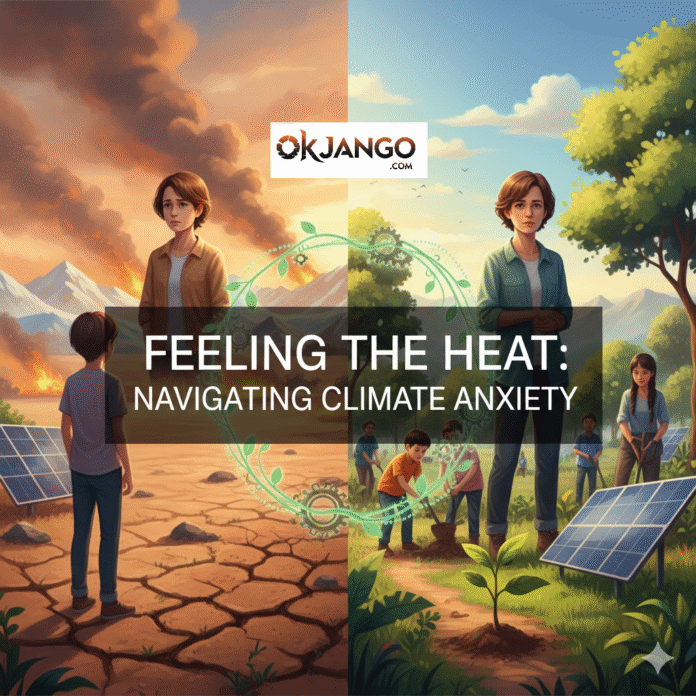The headlines are relentless. Record-breaking heatwaves, devastating floods, and wildfires that paint the sky orange. It’s no surprise that for many, the climate crisis has moved beyond a distant worry to an immediate, deeply personal source of stress. This is climate anxiety, sometimes called eco-anxiety or eco-grief: the chronic fear and distress related to environmental doom and the uncertainty of the future.
If you’ve felt helpless, overwhelmed, or even guilty about your carbon footprint, you are absolutely not alone. This is a very real, very valid response to a global, existential threat.
What Climate Anxiety Feels Like

Climate anxiety is more than just general worry. It can manifest in ways that impact your daily life, your mood, and your relationships. You might experience:
- Intrusive Thoughts: Obsessive worries about the future, disaster scenarios, or the fate of the planet.
- Feelings of Grief and Loss: Sadness over the observed changes in the environment, loss of natural spaces, or a sense of “solastalgia”—a homesickness for a home that is physically changing around you.
- Helplessness and Despair: A paralyzing feeling that the problem is too big for any individual to solve, leading to “climate doom.”
- Physical Symptoms: Insomnia, difficulty concentrating, changes in appetite, or general nervousness.
Crucially, climate anxiety is not a mental illness—it’s a rational human reaction to a threat. Acknowledging it is the first step toward managing it.
Turning Worry into Wellbeing: Coping Strategies
Transforming feelings of climate anxiety and paralysis into focused, meaningful action is vital for long-term mental health. 
The key is shifting your focus from the overwhelming scale of the problem to your personal sphere of influence and community connection.
| Strategy Category | Action to Take | Mental Health Benefit |
| Validate Your Feelings | Acknowledge and Share: Recognize that your fear and grief are normal, rational responses. Talk about your feelings with trusted friends, family, or a counselor. | Reduces Isolation: Breaks the sense of being alone in your struggle and validates your emotional experience. |
| Curate Your Consumption | Set Media Boundaries: Limit your time spent “doom-scrolling.” Intentionally seek out solution-focused news to balance the bad headlines. | Reduces Overwhelm: Protects against chronic stress and prevents anxiety from escalating into paralysis or despair. |
| Focus on Agency | Take Small, Local Action: Commit to manageable, pro-environmental changes (e.g., reducing waste, adjusting diet, conserving energy). | Reclaims Control & Purpose: Fosters a vital sense of accomplishment and demonstrates that your actions matter, countering feelings of helplessness. |
| Engage in Community | Join Collective Action: Find a local group, volunteer for an advocacy organization, or start a climate-aware discussion club. | Builds Resilience: Amplifies your impact, provides a strong social connection, and strengthens the collective ability to face challenges. |
| Practice Self-Care | Connect with Nature & Rest: Prioritize sleep, exercise, and hobbies. Deliberately spend time in natural spaces, even a local park. | Prevents Burnout: Restores mental energy, helps you manage chronic stress, and reminds you of the environment you are fighting to protect. |
The Way Forward is Together
Climate anxiety is a sign that you are paying attention, and that you care deeply about the world. You don’t have to carry the weight of the world on your shoulders alone. By validating your emotions, setting healthy boundaries, and harnessing your worry into meaningful, collaborative action, you can build resilience and find a powerful, sustainable path forward.
If your climate anxiety is severely impacting your daily life, please reach out to a mental health professional. Many therapists are now “climate-aware” and can help you navigate these complex feelings.
Resources for Navigating Climate Anxiety
If you or someone you know is experiencing eco-anxiety or climate grief, these organizations and resources provide community, professional support, and evidence-based information.
1. Professional & Peer Support Networks
These groups offer support and help in processing climate emotions:
- Good Grief Network (GGN): This non-profit provides a peer-to-peer 10-Step program to transform collective grief and eco-distress into meaningful action and resilience. You can find their programs and resources on their official website.
- Climate Psychology Alliance (CPA): An international alliance of therapeutic practitioners and thinkers focused on addressing the psychological and emotional dimensions of the climate crisis.
- Climate Psychiatry Alliance: A professional group of psychiatrists dedicated to understanding and addressing the mental health effects of climate change, often providing directories for specialized care.
- Force of Nature: Offers programs specifically designed for young people to channel their climate anxiety into agency and positive action.
- The Work That Reconnects: Based on the teachings of Joanna Macy, this methodology involves group practices designed to help people process their pain for the world and cultivate active hope.
2. Expert Content and Educational Resources
For ongoing insight, community, and information on the latest thinking in climate psychology:
- Gen Dread / Unthinkable (Britt Wray, PhD): A highly regarded newsletter (recently rebranded as Unthinkable) and platform dedicated to supporting emotional health and psychological resilience during the climate crisis through essays, interviews, and resources.
3. Key Scientific & Policy Reports
For reliable, evidence-based data on the connection between climate change and mental health:
Search the WHO website for “Mental health and climate change policy brief”.
American Psychological Association (APA): The APA publishes comprehensive reports detailing the psychological impacts of climate change, including the effects of extreme weather and gradual environmental changes on mental health.
Link: https://www.apa.org/topics/climate-change/mental-health-effects
Intergovernmental Panel on Climate Change (IPCC): The IPCC’s major assessment reports (specifically Working Group II) are now explicitly recognizing and detailing the detrimental impacts of climate change on mental health and well-being at a global policy level.
To find the reports, search the IPCC website for “Climate Change 2022: Impacts, Adaptation and Vulnerability” and look for Chapter 7.
World Health Organization (WHO): The WHO provides policy briefs and analyses outlining the complex pathways by which climate change contributes to mental health risks globally.
Read more blogs at : Okjango.com


